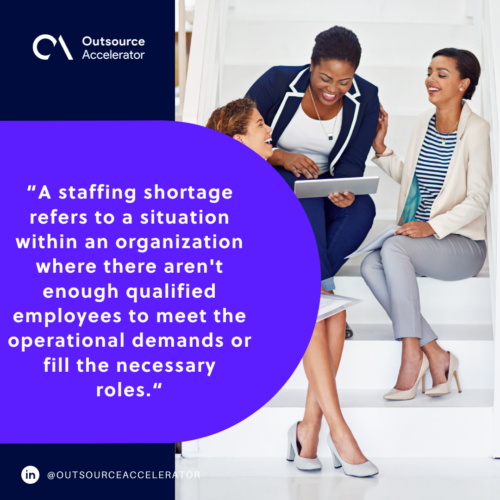Staffing shortage and how to manage it

Staffing shortages can cripple businesses, significantly affecting their productivity, quality of service, and overall growth.
Understanding the causes behind these shortages and implementing effective workforce management strategies is crucial for sustained success.
This article explores the concept of staffing shortage, the root causes of employee depletion, and actionable steps to manage and prevent them.
What is staffing shortage?
A staffing shortage refers to a situation within an organization where there aren’t enough qualified employees to meet the operational demands or fill the necessary roles.
It represents a deficit in the available workforce, often resulting in the following challenges:
- Decreased productivity
- Increased workloads on existing employees
- Potential service disruptions
- Delays in meeting business objectives
A staffing shortage can also significantly impact an organization’s efficiency and effectiveness. This then necessitates proactive measures to address and rectify the imbalance in the workforce.

Causes of a staffing shortage
A staffing shortage has underlying factors. It’s like a domino effect where various elements within the workforce ecosystem are interlinked. When one domino falls, a chain reaction impacts the entire system.
Here are the most common causes of a staffing shortage:
Economic downturns
During economic downturns, companies often face the pressing need to trim expenses and enhance financial resilience.
As a result, they resort to downsizing or freezing hiring processes, strategically aiming to mitigate costs. While these measures may offer short-term relief, they inevitably lead to a reduction in the overall workforce.
However, the repercussions of downsizing ripple through the organization and cause a staffing shortage when the economy eventually recovers.
Demographic shifts
Demographic shifts wield a profound influence on the composition and availability of the workforce.
Changes in population dynamics, such as declining birth rates or an aging workforce, significantly impact the pool of individuals entering the job market. A demographic shift has far-reaching implications, particularly for industries heavily reliant on specific age groups.
Consequently, industries facing this demographic strain struggle to fill vacancies, encountering a staffing shortage of skilled individuals to replace outgoing employees.

Skills mismatch
The swift evolution of technology and the evolving job requirements create a chasm between the skill sets possessed by the current workforce and those demanded by available positions.
This disconnection between employees’ skills and those sought after by employers gives rise to a skills mismatch issue in an organization. This discrepancy contributes significantly to a staffing shortage of qualified candidates more fit for the role.
Low unemployment rates
In economies marked by low unemployment rates, the staffing shortage of available talent amplifies competition among businesses striving to secure skilled workers.
With a limited pool of job seekers, companies encounter heightened challenges in both attracting and retaining top-tier talent. The intensification of this competition often results in bidding wars for qualified candidates.
Moreover, the pressure to stand out as an employer of choice urges organizations to revamp their recruitment strategies and workplace environments. This is to remain competitive in acquiring the limited available workforce.
Retirement of Baby Boomers
The impending retirement of the Baby Boomer generation presents a significant challenge for industries reliant on their expertise and experience.
As these seasoned professionals exit the workforce substantially, industries face a daunting reality—a notable depletion in their talent pool.
How to manage a staffing shortage
By implementing various tactics and leveraging different avenues, organizations can mitigate the impact of staffing deficiencies while working towards sustainable solutions.
Here are ways on how you can manage a staffing shortage in your firm:
Utilize temporary staffing
Engaging temporary staff presents an agile solution to address an immediate staffing shortage. You can hire them yourself or outsource through firms like 123Employee.
Short-term hires provide an instant injection of manpower, offering a quick remedy during sudden surges in workload or unexpected absences among the permanent workforce.
This adaptive approach not only ensures that operational needs are met promptly but also prevents overstaffing during slower periods.
Implement flexible work arrangements
Introducing flexible work arrangements, such as remote work options or flexible schedules, presents a compelling talent acquisition and retention strategy.
Flexibility in work arrangements appeals to a broader range of candidates, including those seeking better work-life balance or those in geographically distant areas.
Moreover, such arrangements enhance employee satisfaction and loyalty, reducing a staffing shortage.
Retain and motivate current employees
Retaining and motivating current employees hinges on several key strategies, prioritizing their growth, satisfaction, and organizational commitment.
Providing opportunities for skill enhancement showcases the organization’s dedication to their professional growth.
Beyond just salaries, comprehensive benefit plans, performance-based incentives, and recognition programs are strong motivators.
Equally significant is the creation of a positive work environment. Cultivating a culture that fosters collaboration and a sense of belonging impacts employee morale and loyalty.
When individuals feel supported, respected, and part of a thriving workplace community, they are likelier to remain engaged and committed to the organization’s goals.
As a result, these initiatives prevent a staffing shortage from occurring unexpectedly.

Prevent future staffing shortages with these tips
Avoid staffing shortages by implementing the following:
- Expand outreach beyond traditional methods to attract a wider pool of candidates, leveraging social media, job fairs, and industry-specific platforms.
- Provide continuous skill development and training opportunities to upskill current employees, reducing dependence on external hiring.
- Identify and groom internal talent for future leadership positions to bridge potential skill gaps due to retirements or turnovers.
- Collaborate with educational institutions or industry organizations to establish pipelines for fresh talent entering the workforce.
Furthermore, by understanding the causes behind these shortages and implementing proactive measures, organizations can effectively build resilience against future staffing crises.







 Independent
Independent




